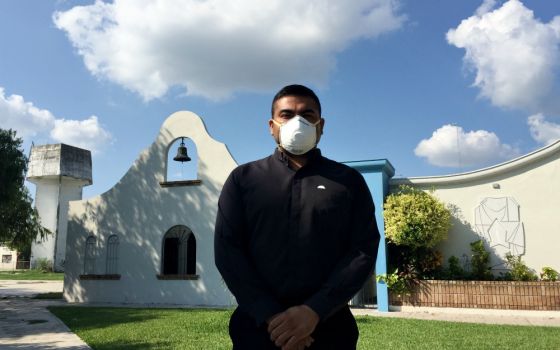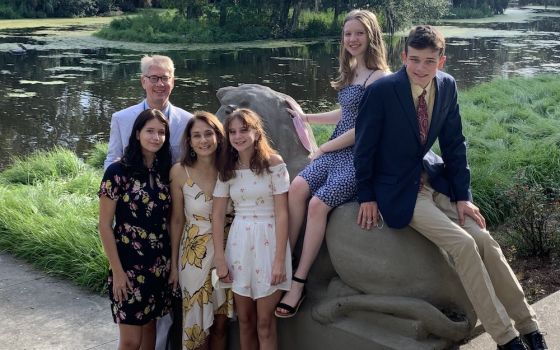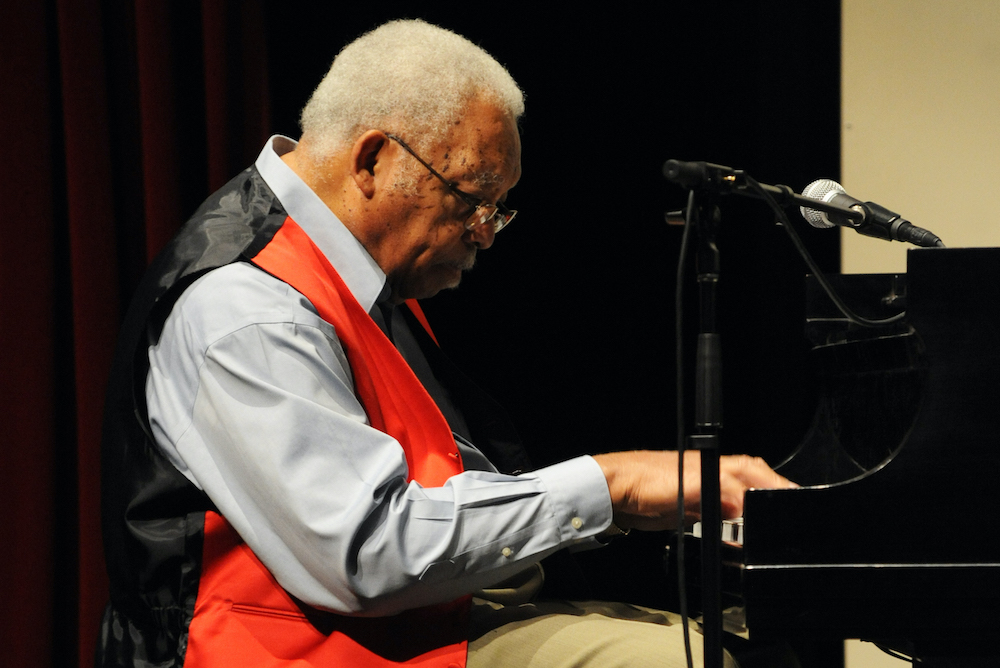
Ellis Marsalis Jr. performing in the Ellis Marsalis Trio at Dixon Hall, Tulane University School of Arts, New Orleans, Oct. 21, 2010 (Wikimedia Commons/Tulane Public Relations)
Editor's note: On Holy Thursday, Pope Francis prayed for the dead as well as for the priests, doctors and nurses who he said represented the "saints next door" during the coronavirus pandemic. Over the next months, National Catholic Reporter and Global Sisters Report will be bringing the stories of Catholics in this crisis: those who have died, but also those whose service brings hope. To submit names of people for consideration for this series, please send a note to saintsnextdoor@ncronline.org.

The news on April 1 that Ellis Marsalis Jr., 85, had died of COVID-19-related pneumonia opened a river of national tributes for New Orleans' premier jazz pianist, professor and the patriarch of a musical family with remarkable aesthetic reach.
Government shutdown orders prohibited the pageantry of a jazz funeral, the second line of street dancers parading to brass band melodies. Churches were closed, parading banned. Orleans Parish, which includes the city, ranked in the top 10 U.S. counties for per capita deaths from the coronavirus. Along Rampart Street's grassy median opposite St. Jude shrine at Our Lady of Guadalupe church, people with rosary beads stood apart, murmuring prayers to the saint for hopeless cases.
Marsalis had begun teaching in the 1960s at Xavier University, the nation's only historically black Roman Catholic college, founded in 1925 by St. Katharine Drexel. Stirred by the city's gloom, Xavier President C. Reynold Verret, a chemist by training, wrote a poem, "Tolling the Bell," published here with permission:
Last night, Ellis Marsalis went away,
Piano keys tug at their locks and rend their robes,
And each in their seclusion weeps so silently.No second line,
No coming home of acolytes,
The many musician daughters and sons,
Emissaries of the old man to many places,
To share the gift.None may return
To ring the bell,
To celebrate,
To mourn.In the emptiness of St. Peter's Square
A lonely Pope stood before God
And called me from afar, 9
That I too may join with him in prayer,
Make my return, give thanks
As thanks we must.In solitude, we remember.
In cells of marble or
made of simpler things,
We weep.
Ellis Marsalis carried the spiritual imagination of the city in his music. Pianists, however, have no role in burial parades — the work of marching brass bands. When Dolores, his wife and soulmate of more than 57 years died in 2017, Ellis stood outside Mater Dolorosa Catholic Church as his musician sons — Branford, Wynton, Delfeayo, Jason — raised their horns in tribute to their mother with a large brass band assemblage playing "I'll Fly Away."
All six sons had grown up going to the church. As Ellis' life ended, the brothers faced the task of burial under emergency conditions.
Advertisement
The sons gather
On March 12, the jazz drummer Jason Marsalis, up in Manhattan for a marquee gig at Carnegie Hall, learned that American Symphony Orchestra had canceled its concert honoring Duke Ellington. The city of cities was shutting down.
Standing well above 6 feet, Jason, 43, is a percussionist with a natural touch for melody. His wife, Kaya, and their three daughters were sequestering in New Orleans; he caught the first flight home.
His brother, Wynton, 58, the vaunted trumpeter, composer and director of Jazz at Lincoln Center, scrambled to finish work, but as he got word of his father's crisis, the shutdown prevented him from flying out.
"Believe me, it hurt Wynton not to be here," Jason told NCR.
In an age saturated by dysfunctional family themes, Ellis and Dolores enjoyed a long marriage, revolving around her faith and his music in raising their sons. Family dynamics pervade the Marsalis' recordings, and in times as bleak as these, showcase the best of the human experiment.
Ellis was moving slowly, using a walker, when he announced his retirement in December from the long-running Saturday night sets at Snug Harbor, the Frenchmen Street jazz club where tourists booked seats long in advance. Working with a trio or quartet, Marsalis' ranging right-hand improvisations glided across zones of melody with an elegance to match his artistry. "Gracious" and "soft-spoken" apply, but Ellis had a streak of the provocateur, treating conversations, like jazz, as improvisation, as if to say: "Here's my take; what's your counter-melody?"
On learning of his dad's fragile state, Branford, 59, the oldest son, a saxophone star who has acted in Spike Lee movies, set out for New Orleans from his home in Durham, North Carolina, while Ellis III, 56, a photographer and poet, drove down from his base in Baltimore.
Delfeayo, 54, a trombonist, producer and leader of the Uptown Jazz Orchestra, lives in New Orleans, like Jason.
The sixth brother, Mboya Kenyatta Marsalis, 49, is autistic; he lived with his father, with support from a schedule of caregivers, in the house on Hickory Street where all of the siblings grew up.
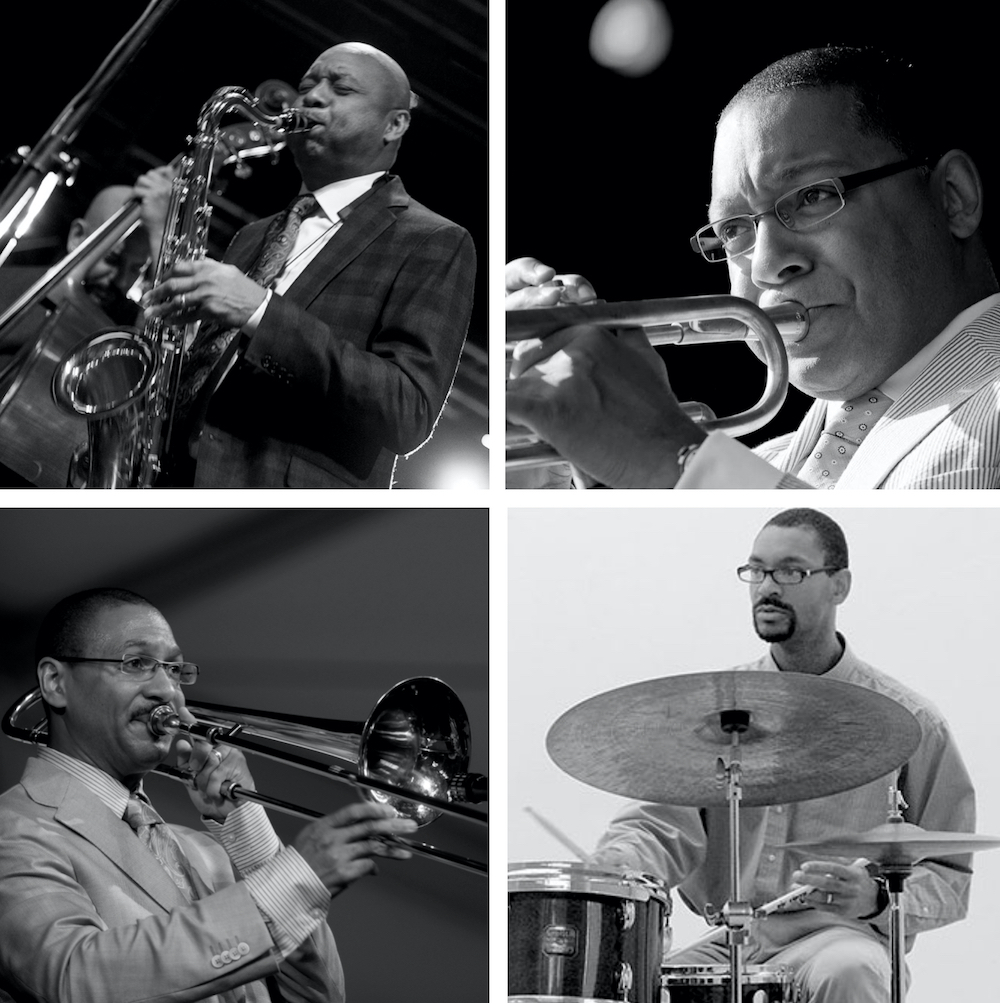
Top left: Branford Marsalis playing at the Lotos Jazz Festival in Bielsko-Biala, Poland, March 21, 2019 (Wikimedia Commons/Dorota Koperska Photography); Top right: Wynton Marsalis playing at the Seventh Annual Jazz Festival in the Oskar Schindler Performing Arts Center, West Orange, New Jersey, Sept. 13, 2009 (Wikimedia Commons/Eric Delmar); Bottom left: Delfeayo Marsalis playing on the WWOZ Jazz Stage with the Uptown Jazz Orchestra at the New Orleans Jazz and Heritage Festival, May 2, 2010 (Wikimedia Commons/Derek Bridges); Bottom right: Jason Marsalis playing in Aarhus, Denmark, 2009 (Wikimedia Commons/Hreinn Gudlaugsson)
Father-and-sons careers
In a reversal of sons following fabled fathers into the glow, Ellis achieved celebrity as Wynton's career soared.
Columbia Records' 1982 "Wynton Marsalis" (with Branford on tenor or soprano saxophone cuts) gave the jazz world a huge shot of adrenaline. Wynton, 19, had left The Juilliard School to tour with Art Blakey's Jazz Messengers before his break-out record. The shimmering melodies and lyrical trumpet thrilled critics for its reach back to a polished ensemble sound and swing echoes in the trumpeter's roaming poetics. The first cut was called "Father Time."
Wynton soon won Grammys in jazz and classical music: He began recording with Ellis. Wynton's presence, in suit and tie, tracked Ellis' formality, an image other young jazzmen began to replicate, cutting away from the jeans, fatigues and dashikis of an aging avant-garde.
Ellis went on to 19 recordings as a headliner and four collaborations on Wynton's more than 100 recordings. The father shared billing on five of Branford's 30 albums, three on Delfeayo's eight recordings, and three with Jason.
"Ellis' sons have appeared on more than 500 recordings, when you include their role as featured artists for other headliners," explains George Ingmire, a sound engineer, archivist and online radio host at GeorgeIngmire.com.
Ellis grounded the four musical brothers in jazz-as-canon, a tradition risen from spirituals and work songs to early blues and New Orleans jazz, dance music with warm melodies, evolving into the swing era of the Ellington and Count Basie big bands, unto the bebop jazz of Dizzy Gillespie and Thelonious Monk that influenced Ellis, starting out. Wynton's Jazz at Lincoln Center programs embraced the canon for continuing show and concerts.
Ellis was a founding teacher at New Orleans Center of the Creative Arts, a high school launched in the 1970s with competitive auditions for students, hundreds of whom have gone on to careers in music, writing, theatre, film and the fine arts. Marsalis often said that he taught students, not music. In 1990, he accepted an endowed chair at University of New Orleans for its new jazz studies program. He taught there 12 years. Between NOCCA and UNO, Ellis had a major hand in the molding of a legion of jazz artists, among them Harry Connick Jr., Terence Blanchard, Nicholas Payton, Donald Harrison Jr.
In 2011, the National Endowment for the Arts gave its prestigious Jazz Master Award to Wynton, Ellis, Branford, Delfeayo and Jason, the only family to be so honored.
A son's 'North Star'
"I like the idea of the Socratic circle," Ellis once told me, referencing the dialectic that drives a sitting group: questions spur answers, new questions fuel more answers in synthesis like a turning wheel. "I got that at Loyola," he said. In 1974 he earned a Master of Music Education degree at the local Jesuit university when the boys were young. He liked issuing ideas for response, "provided you bring knowledge to the circle."
Late last month, the circle began closing. Ellis caught the fever and was diagnosed with COVID-19. On March 28 an EMT took him to Ochsner Medical Center.
From New York, Wynton called him, and as he would write in a post a few days later, told him to be careful, it wasn't time for him to pass away: "Man, I don't determine the time," Ellis replied stoically. "A lot of people are losing loved ones. Yours will be no more painful or significant than anybody else's."
As a boy in the 1970s, Wynton went with his daddy to gigs, as he writes earlier in the post, where a few people sat "in unglamorous places, and there, in the passing years, I learned what it meant to believe in the substance of a fundamental idea whose only verification was your belief.
I only ever wanted to do better things to impress him. He was my North Star and the only opinion that really deep down mattered to me was his because I grew up seeing how much he struggled and sacrificed to represent and teach vital human values that floated far above the stifling segregation and prejudice that defined his youth but, strangely enough, also imbued his art with an even more pungent and biting accuracy. … he really didn't complain about stuff. No matter how bad it was.
The Marsalis home on Hickory Street, an easy walk from the Uptown streetcar stop on South Carrollton Avenue, has a yard with a statue of the Madonna their mother installed when the boys were young.
Born in 1937, Dolores Mary Ferdinand came from a Creole family and held deep loyalty to Sisters of the Holy Family nuns who taught her as a girl. She took the boys to Mater Dolorosa on South Carrollton Avenue. Ellis went sometimes, more often slept late.
He had grown up attending St. James African Methodist Episcopal Church, across town in the Tremé neighborhood, a church whose history stretched back before the Civil War when police invaded services that welcomed the enslaved.
Eugenia Adams, a friend of his and a retired nurse who attended St. James, told NCR: "Like Ellis, I went to Catholicism. My mother was Catholic. He became a Catholic because of Dolores — in order to marry her."
Born Nov. 14, 1934, Ellis Marsalis Jr. played clarinet and saxophone at Booker T. Washington High School before settling on piano. His father ran Marsalis Mansion, a motel and nightclub in a black enclave of Jefferson Parish, the near suburb. Motel guests, barred by segregation laws from staying in the downtown hotels, included the Rev. Martin Luther King Jr., Thurgood Marshall, the first African American justice of the Supreme Court, and singers Ray Charles and Etta James.
After graduation from Dillard University and a stint in the Marines, Marsalis met Dolores Ferdinand at a Dinah Washington concert; they married Dec. 31, 1959.
Their sons absorbed an emphasis on reading beyond school work, and music shaped by practice, practice, practice. The backlash to civil rights protests stirred Dolores to tell Wynton, "Child, every year that passes, I understand just how profound slavery was."
With four sons barely six years into marriage, Dolores managed things on a tight budget. Ellis played gigs to bolster his salary as Xavier University's bandleader and a music history instructor. Home life had its rocky moments. As a teenager with an Afro haircut, Wynton once recoiled from another spaghetti dinner, only to feel the plate dumped upon him. As the pasta seeped down, his mom said: "Every king must have his crown."
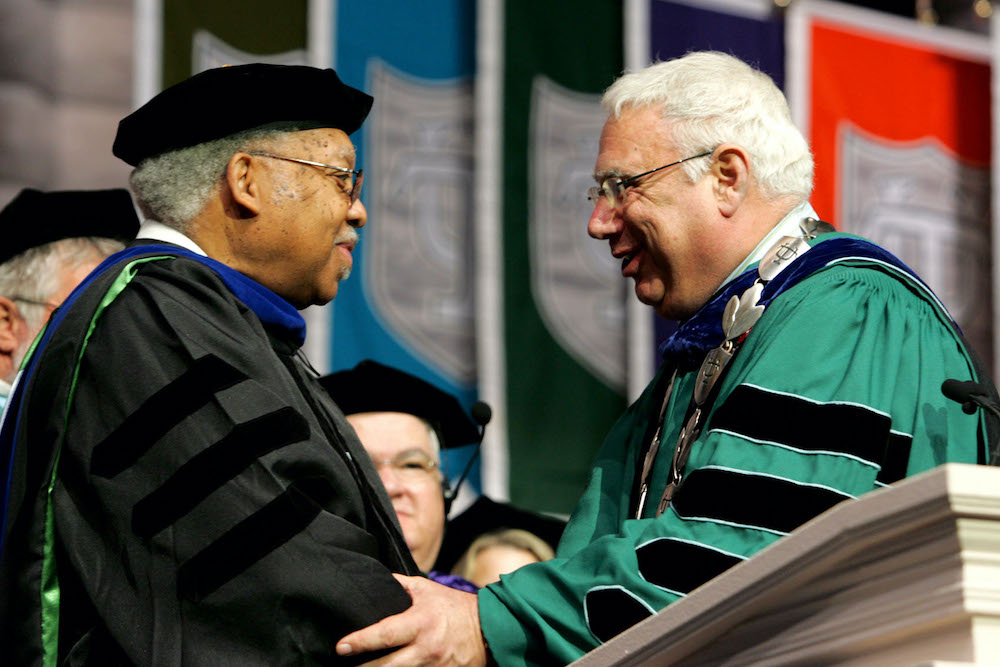
Ellis Marsalis Jr., left, shakes hands with Scott Cowen, Tulane University president July 1998-June 2014, at the school's commencement exercises May 19, 2007. Marsalis was awarded an honorary doctorate degree from the school that year. He has several others from other institutions of higher learning. (Wikimedia Commons/Tulane Public Relations)
'Go ask your daddy'
Branford recalled his upbringing in a 1990 interview on "Mister Rogers' Neighborhood," saying: "We have a certain outlook on how we're supposed to carry ourselves in the world and [how] we should see other people and treat other people that I think really has a profound effect on what we play musically."
Delfeayo, just above Mboya in the sibling line, was inspired by his brother to found the Uptown Music Theater for children. When he bought a house near St. Charles Avenue, Delfeayo put a black Madonna in the yard and a statue to St. Bernadette. "It was a way of honoring my mother," he told NCR.
"My mother had a vision of family and is responsible in many ways for my dad's legacy. Her father left when she was born; she wanted to get married, and worked to stay married. She grew up with mother and aunts, and ended up with six boys. She was an early feminist, serious about women's rights and wasn't gonna take no mess."
Delores raised her sons to be kind, but tough, says Delfeayo, the lone sibling who still attends Mass. "Black folks of her generation didn't have certain opportunities, especially women with men. She made sure we had a relationship with our father. He worked long hours — at school teaching from 9 to 3 — then the 7-to-10 p.m. Hyatt Regency gig. 'Go ask your daddy' helped us strengthen our bond with him. Everything I wrote, whether a term paper or liner notes, I showed him. He had a good sense of grammar, language and helped me shape the form of what I was writing."
In 2017, the brothers were together for Dolores' final days. She died at home, age 80, of pancreatic cancer. All six gave a champagne toast to her in the yard.
Branford, Wynton and Delfeayo joined the brass band that ushered Dolores' coffin out of Mater Dolorosa, playing "Amazing Grace" as a dirge and "I'll Fly Away" before the parade of second liners.
As his father lay in the hospital, Ellis III stayed on Hickory Street with Mboya. Branford stayed at a hotel. The brothers, save for Mboya and Wynton, unable to leave New York, managed to visit the hospital individually to see Ellis. By April 1, they knew time was running short; At 6:30 p.m., Jason said, "I'm going now."
"I'll see you later," the old man replied.
A short while later, Jason was at Hickory Street when the hospital called. Gently, he told Mboya, "Dad passed away." Mboya's head tilted down.
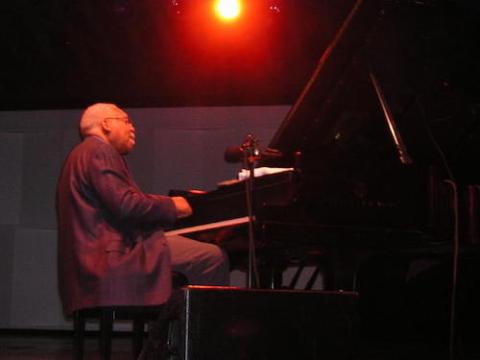
Ellis Marsalis Jr. performing at Hartwood Acres, Pittsburg, Pennsylvania, June 6, 2004 (Wikimedia Commons/Lee Paxton)
The Times-Picayune | The New Orleans Advocate gave substantial coverage to Marsalis' passing, and as national media tributes poured in, WWOZ, the community radio station played long segments of his music.
Dr. Michael White, the clarinetist and composer who holds an endowed chair at Xavier University, took a break at home from teaching online, the jazz history course he took as a 1970s' undergraduate with Ellis, the canon now expanded.
"The funeral is way of paying tribute and honor, but you adjust to real conditions," White reflected. "I sat in my study, alone, and played a song for Ellis, 'Just A Closer Walk With Thee.' You hope on some level spiritually that he hears it and feels it. Jazz is about improvisation and adjusting to conditions Even though these conditions are hard and unusual, it still doesn't stop the spirit in the music."
Mount Olivet Cemetery allowed 10 people, wearing face masks and gloves. Jason, Delfeayo, Branford and Ellis III watched the coffin go down, aside Dolores's plot. Jason said a few words. Ellis III read lines of Scripture.
"A year ago," says Jason, "my wife asked Dad what he wanted for a funeral, and he said it didn't matter because he wasn't going to be there. The funeral was sad, but fitting."
Delfeayo: "He did not want a priest. He may have believed in a higher power but not the religious process. He was pragmatic and a realist; he did not want great fanfare, but he understood people would have wanted that. The pandemic changed everything. In a surreal way, knowing that he had the kind of funeral he'd have wanted makes it feel better."
Mboya's care drew the brothers into a discussion that Delfeayo resolved. He saw what Ellis had done and knew what Dolores would want. Mboya would move into his home with his wife and daughter, the house with the statues in the yard.
[Jason Berry is finishing a documentary, using burial traditions as a narrative lens, based on his 2018 book, City of a Million Dreams: A History of New Orleans at Year 300.]





